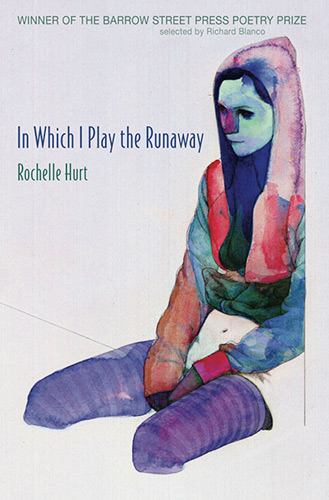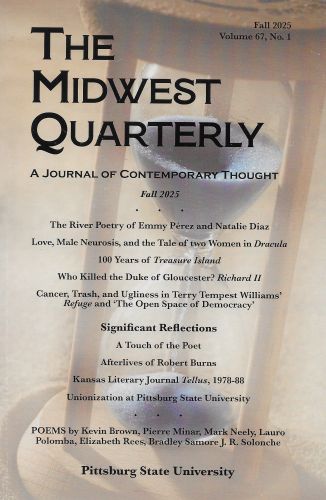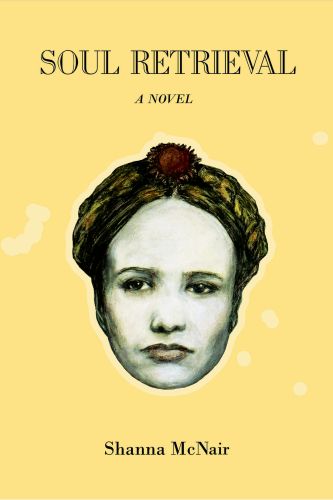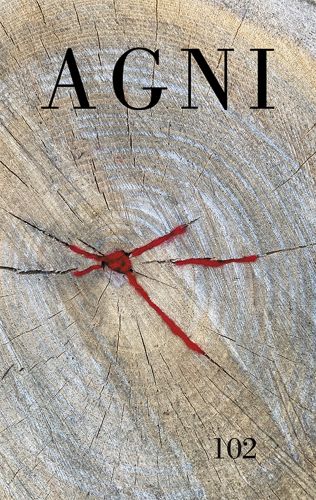Selected by Richard Blanco as the 2015 winner of The Barrow Street Press Poetry Prize, Rochelle Hurt’s In Which I Play the Runaway is a tightly-structured map of the human heart. Spanning the ventricles of mythical America, each section is named after a town: Last Chance, California; Hurt, Virginia; Needmore, Indiana; Accident, Maryland; and Honesty, Ohio—the author names the inner-workings of daughter, mother, wife, and poet. Almost all the sections conclude with a prose poem and contain self-portraits and dioramas. Dorothy from The Wizard of Oz provides a dramatic-persona through-line, much in the vein of Berryman’s alter-ego Huffy Henry, creating a close to perfectly-structured second collection.
Selected by Richard Blanco as the 2015 winner of The Barrow Street Press Poetry Prize, Rochelle Hurt’s In Which I Play the Runaway is a tightly-structured map of the human heart. Spanning the ventricles of mythical America, each section is named after a town: Last Chance, California; Hurt, Virginia; Needmore, Indiana; Accident, Maryland; and Honesty, Ohio—the author names the inner-workings of daughter, mother, wife, and poet. Almost all the sections conclude with a prose poem and contain self-portraits and dioramas. Dorothy from The Wizard of Oz provides a dramatic-persona through-line, much in the vein of Berryman’s alter-ego Huffy Henry, creating a close to perfectly-structured second collection.
The first and title poem, “Poem in Which I Play the Runaway” sets the tone:
But if you want it, I’ll give
the story of a woman’s deboning
by a pair of junk-rotted hands,
her good marrow honed to a prick
on a promise like a diamond file.And how she loved it, the sin itself
a new kind of homelessness.
Full of coded confession, probing accusations, and endless curiosity, Hurt’s poems explore relationships behind closed doors. Divorce, assault, nature, nuances of color, a sense of home-seeking, and longing for love and family are the themes that give these poems coherence. Spectacular lines like, “I was born an apology” fit seamlessly onto each page. “Self Portrait in Hurt, Virginia” concludes with a powerful tercet, making the reader yearn for narrative:
You’ll never tell home from hurt,
my father said. His kiss was a curse
placed on my mother’s forehead.
Yet, the ground shifts and only images remain as sign-posts. Hurt is onto Aimwell, Alabama, or “licking your cowlick with vinegar” as The Lone Ranger plays on the radio and she returns to inhabit Dorothy battling a “juiced” Uncle Henry. “Next time, you tell yourself, / a mask will be your saving.”
“Halfhearted,” a gem of a prose poem, is outstanding. Minimalistic, yet narrative, much in the style of Lydia Davis, Hurt goes deep into the divided self. The one that seeks survival and security. The other that seeks wild romance:
So I made sure love hitched me to a duplex: two is better than one, right?
[ . . . ] To stay faithful, I never let my two husbands touch the same parts of me. I severed myself into half-breaths, half-laughs, half-peeks. Three days a week I lived in the right side of my body, dragging my left leg behind me. On three other days, I lived in the left [ . . . ].
But here’s where I got the break: on the seventh day of each week I lived in the pit of myself. Houseless, husbandless, I slept outside, balanced on a rock—tough, whole, unable to be consumed by any desire. On those nights I was happy.
Hurt writes with a rare honesty and depth. Clearly, she can explore two conflicting ideas in her head at the same time and still write a ground-moving poem. When faced with diverging roads, the ability to imagine and explore both is a gift. In “Poem in Which I Play the Sideshow,” Hurt elucidates:
Who doesn’t want it both ways? A siren-saint.
So it was currency, this crock—an act of girl,
not god. Love was a blade I could eat any day—two at a time seemed easy. I took them
in vanity, watching myself as if
from across the room, amused.
That out-of-body experience, that meeting of doppelganger, that moment when actor steps into character, that child understanding what is pretend—these are the moments that Hurt is traversing masterfully. At the same time, we are traipsing across America, through a childhood, witnessing a diorama of a family living room with an intuitive and compelling guide. With smartly-layered prose and potent verse, In Which I Play the Runaway is simultaneously an emotional map and wistful destination.





